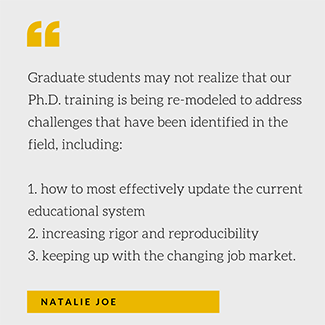As graduate students, we spend our days in the lab and are constantly working to balance setting up experiments, tackling our coursework, and attending relevant seminars and meetings. With this hectic day-to-day life, it can be easy to lose track of time, as well as the big picture of our Ph.D. training and the overall outlook of biomedical education. Thankfully, our thesis advisers, committee members, program directors, deans, the National Institutes of Health (NIH) and others are actively monitoring trends in biomedical education to understand how to improve the curriculum to best fit the changing needs of students today. Graduate students may not realize that our Ph.D. training is being re-modeled to address challenges that have been identified in the field, including: how to most effectively alter and update the current educational system, increasing rigor and reproducibility, and keeping up with the changing job market.
Over the past decade, mentors have realized that the need for “a major overhaul of how we educate graduate students in biomedical research is long overdue.” 1 The process of working toward a Ph.D. has remained relatively unaltered for about 25–100 years, depending on who you ask — but either way, that’s a long time in a constantly changing and adapting field. 1, 2 So, why has it taken so long to alter the way that science is taught?
- First, a singular and all-encompassing plan to address the demands of teaching today’s overwhelming wealth of scientific information has not been proposed. It will take a unified effort to find a solution.
- Second, not only do graduate students have to learn breadth and depth of a single field, but now there is a need to become interdisciplinary researchers to avoid becoming overspecialized in a particular field. Ph.D. programs also must focus on preparing students for the increasing number of job opportunities outside of academia, while we are trained in an academic setting — all without increasing time to graduation. 1–4 Suffice it to say, there are a lot of moving parts that must be considered when revamping the Ph.D. process. Thus, several efforts are being made nationwide, and at Hopkins, to address this new era of biomedical education.
Some institutions are turning to increasing course loads to allow students to do more job exploration or increase scientific background content, but this can lead to “cognitive overload and low information retention rates.” 3 This may even come at the cost of students not learning “critical thinking, creative problem solving, and putting what was learned into a larger context that creates meaning.” 3 Reports of students losing the key concepts of a Ph.D. have raised more awareness about the lack of reproducibility, rigor and responsibility in young researchers’ training. 1–4 Previously, it was the student’s thesis adviser’s job to not only train scientists, manage a lab and maintain funding, but also to ensure that each trainee is instilled with the necessary tools to become a responsible researcher and contribute to humanity.1–4 This is obviously quite a tall order for one person to fulfill, and may not be a reasonable expectation for modern principal investigators.
Graduate Student Training Modules
 Therefore, a more diverse approach was addressed by the NIH to utilize “training modules” to increase rigorous and reproducible research in their T32 grant funding (For more information on T32 training grants: 1 In addition, individual institutions and graduate programs have increased their efforts to ensure proper training of their students and reduce retraction rates and reporting of unsound data. 3 The Johns Hopkins Bloomberg School of Public Health created the R3 program to incorporate philosophical education alongside traditional biological science training as a means to instill a deeper understanding of the scientific process as a whole, as well as rigor, reproducibility and responsibility within the next generation of scientists. Other institutions are similarly requiring that a spectrum of skills be taught throughout the early Ph.D. curriculum, including coursework or required seminars on proper scientific methods, data interpretation, quantitative analysis, communication, teamwork and more, before a student even enters a laboratory! 1
Therefore, a more diverse approach was addressed by the NIH to utilize “training modules” to increase rigorous and reproducible research in their T32 grant funding (For more information on T32 training grants: 1 In addition, individual institutions and graduate programs have increased their efforts to ensure proper training of their students and reduce retraction rates and reporting of unsound data. 3 The Johns Hopkins Bloomberg School of Public Health created the R3 program to incorporate philosophical education alongside traditional biological science training as a means to instill a deeper understanding of the scientific process as a whole, as well as rigor, reproducibility and responsibility within the next generation of scientists. Other institutions are similarly requiring that a spectrum of skills be taught throughout the early Ph.D. curriculum, including coursework or required seminars on proper scientific methods, data interpretation, quantitative analysis, communication, teamwork and more, before a student even enters a laboratory! 1
Less Tenure, More Uncertainty
Another shifting trend is the consistent decrease in the amount of academic, tenure-track positions, and a decrease in the proportion of students pursuing these types of jobs, resulting in a need for graduate school training that offers better preparation for the current job market. 1–4 Previously, generating great principal investigators was the main goal of a Ph.D. program, and institutions have only recently been trying to shift to a different mindset. 3 At Johns Hopkins, we have the Professional Development and Career Office, as well as workshops, communities and student-led groups that are available to increase student awareness about science communication, consulting, industry, government, and policy jobs that are available. Although these resources are a great start, it will take individuals from each field to step forward to mentor the next round of scientists to find their own career paths, and this won’t happen overnight. 3
Diversity and Collaboration at Johns Hopkins
In 2013, the Committee on the Future of Ph.D. Education at The Johns Hopkins University made a firm point to “explore the challenges of the opportunities for Ph.D. education given the current economic, social and political context.” 4 A plethora of challenges was raised in the report, which included recommendations to increase diversity by making it easier for faculty members to collaborate, increasing mentorship training for faculty, ensuring students have a good life-lab balance by monitoring the Graduate Student Association survey answers, providing guidance for thesis adviser and mentee relationships, and maintaining a focus on continually adapting to keep Johns Hopkins at the forefront of innovation. 4 I am confident that as a graduate student, it is my responsibility to stay informed about my own training and be proactive, and I feel comfort in knowing that my institution aims to keep trainees ahead of the curve, with our well-being in mind.
References
- Gammie, Alison; Lorsch, Jon; Singh, Shiva. Catalyzing the Modernization of Graduate Education. NIGMS Feedback Loop Blog. National Institute of General Medical Sciences, Nov. 30, 2015.
- Leshner, Alan I. Rethinking Graduate Education. Science, 349(6,246):349, 2015.
- Bosch, Gundula; Casadevall, Arturo. Graduate Biomedical Science Education Needs a New Philosophy. American Society for Microbiology, 8(6), 2017.
- Johns Hopkins University. Committee on the Future of Ph.D. Education Final Report, September 2013.
